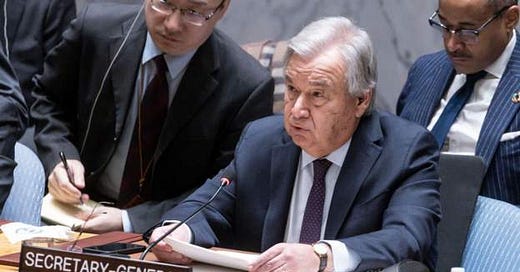[All A Level Geography students are required to know about the work of the United Nations (UN) as a key player of global governance. Here are some general points and some more recent points.]
The UN in December 2023
On Friday 8th December 2023, the UN Secretary General Antonio Guterres tabled a resolution at the Security Council, backed by the UAE, that called for a ceasefire in Gaza. Out of 15 member nations on the Council, 13 voted in favour of the resolution. The United States was the only country to vote against, thereby vetoing the resolution. The UK abstained. Over 80 other nations had expressed support for the resolution.
The UN has been accused of ‘toothless resolutions and empty rhetoric’ over its response to the Israel/Gaza war. However, Secretary-General Guterres used a diplomatic tool that was last used in 1971 during a conflict that resulted in the creation of Bangladesh. He invoked Article 99 from the UN charter, forcing the Israel/Hamas war on to the Security Council’s agenda.
The UN has had a controversial role as an arbiter of peace in the Middle East. The Security Council previously voted in favour of military intervention in Libya in 2011 to protect civilians. At the time, Russia abstained, and President Vladimir Putin used it as an example of why the West cannot be trusted, saying the resolution was but a thinly disguised ploy to enact regime change and topple Muammar Qaddafi.
In recent days, the USA has been frustrated by Israel’s conduct of the war against Hamas and has expressed worries about the mounting death toll. Typically, its role in the UN has been to protect its ally (Israel) from criticism but in November it withheld its veto to let a resolution pass calling for a humanitarian pause.
Israel has made clear its disdain for the UN and Guterres. It views the multilateral organization as being ‘stacked’ with Arab voices and deeply partisan to the Palestinian cause. It has called on the UN chief to resign.
The United Nations (UN) – general points
The UN is an international organisation designed to make the enforcement of international law, security, economic development, social progress, and human rights easier for countries around the world. It includes 193 countries as its Member States, and its main headquarters are in New York, USA.
The UN is the most representative inter-governmental organisation in the world today. It has made enormous positive contributions in maintaining international peace and stability, promoting cooperation among states and international development. The UN believes that only through international cooperation can mankind meet the challenges of these issues in the global and regional contexts. The UN plays a pivotal and positive role in this regard. However, some have pointed out that some of the actions of the UN have exacerbated inequalities and injustices.
The UN operates through applying the principles of the Charter of the United Nations and its main authority in maintaining international peace and security is through the Security Council. The UN states that to strengthen its role, it is essential to ensure to all Member States the right to equal participation in international affairs, and that the rights and interests of the developing countries should be safeguarded. Although the UN does not maintain its own military, it does have peacekeeping forces which are supplied by its member states. On approval of the UN Security Council, these peacekeepers are often sent to regions where armed conflict has recently ended, to discourage combatants from resuming fighting.
In addition to maintaining peace, the UN aims to protect human rights and provide humanitarian assistance when needed. In 1948, the General Assembly adopted the Universal Declaration of Human Rights (UNHDR) as a standard for its human rights operations. The UN currently provides technical assistance in elections, helps to improve judicial structures and draft constitutions, trains human rights officials, and provides food, drinking water, shelter, and other humanitarian services to peoples displaced by famine, war, and natural disaster.
In 2000, the UN established its Millennium Development Goals (MDGs). Most of its member states and various international organisations agreed to achieve these goals relating to reducing poverty, child mortality, fighting diseases and epidemics, and developing a global partnership in terms of international development by 2015. Some member states have achieved several of the agreement's goals while others have reached none. This is cited as one example where the UN may have exacerbated inequality around the world.
The Sustainable Development Goals (SDGs) were agreed in September 2015 with some targets similar to the MDGs, such as ending poverty and hunger, and others focused more on combating the threat of climate change and protecting oceans and forests from further degradation. To be successful, the SDGs will require a more effective UN system. A growing number of emerging nations are likely to play an expanded role in this system, with probably a larger financial contribution, greater presence in governance, a stronger voice, and a greater influence.



